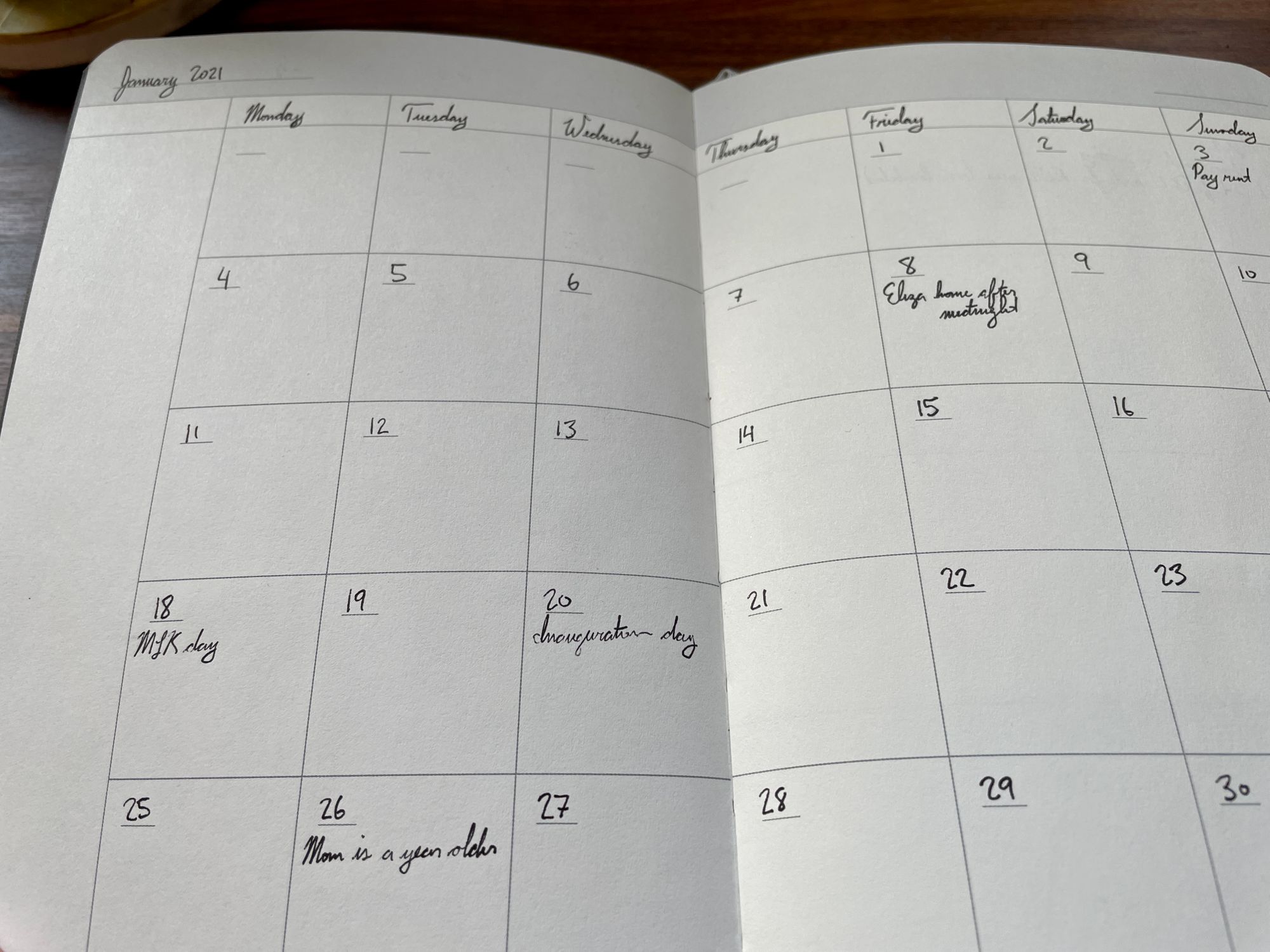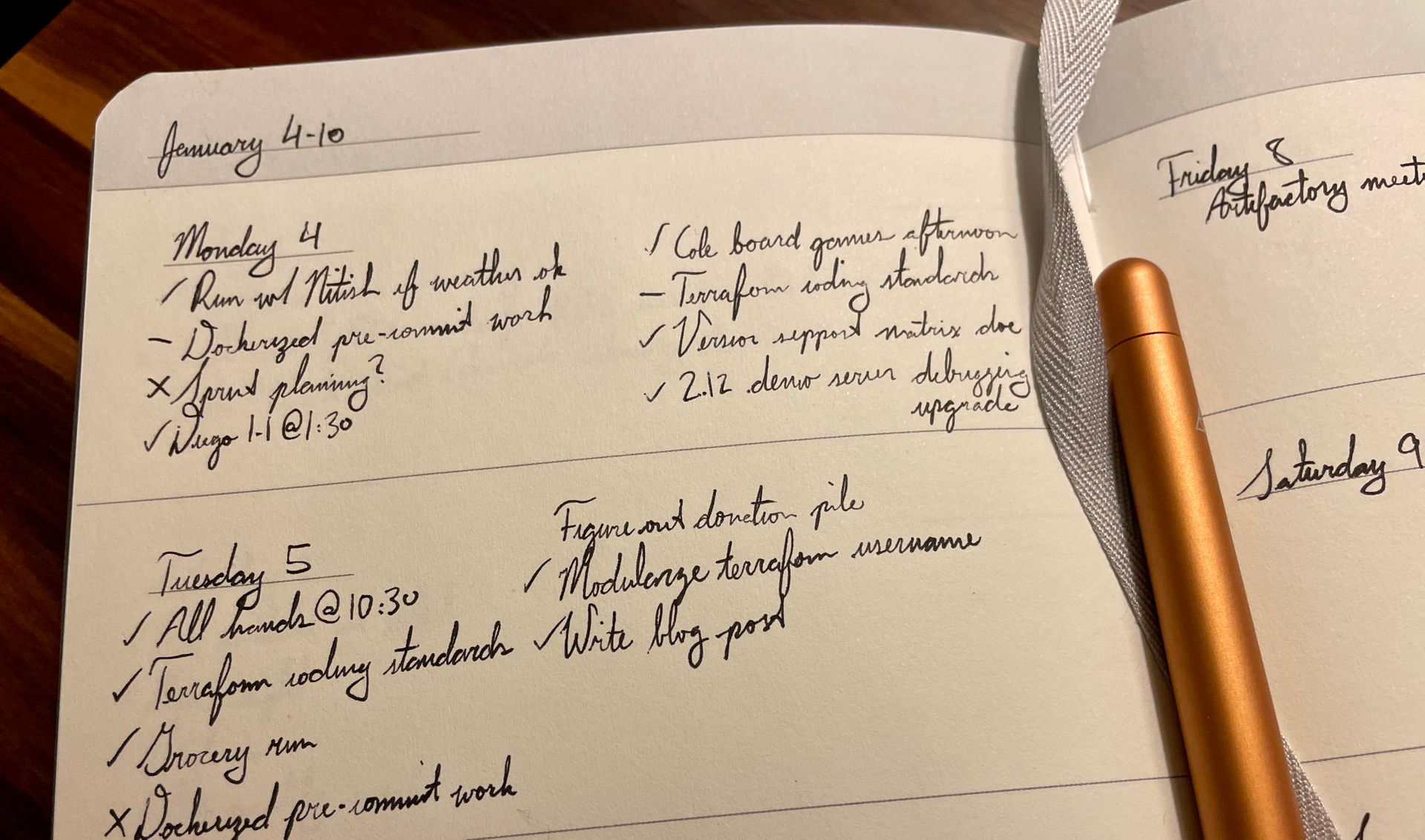It's Friday night and I'm about to go to bed, but something caught my eye as I started tidying up my desk for the night: my notebook.
I keep a physical notebook with a calendar in it. Every morning, I write down the things I have to do and check them off when I complete them. If I don't get to the task, or something higher priority came up, I explicitly mark the task as not done, and it gets added to the list for tomorrow. Many people have a system like this.
My problem is keeping it up. Today at work I was able to single-mindedly focus on a specific task, and so I never opened the calendar. It was obvious what I was going to be working on, and I didn't think the single line entry was worth it. There were no notes worth taking, so I never opened up the notebook section, either. This on its own is fine; some days are straightforward and there's nothing to remember. The problem is that I haven't opened this notebook since Monday.
High Inertia Items
I was recently introduced to the idea of "ugh fields", which is apparently a more common phrasing for what I've called "high inertia items."

The idea is simple: some tasks that you put off aren't hard, but knowing they still exist is enough to make you flinch and not finish them. For some people, doing laundry falls into this category. You put it off and off and eventually the pile is too embarrassing to even look at. Some tasks (like the laundry example), do have to be completed eventually, but it comes with resentment and extra stress. Some tasks don't and are forever on the todo list.
The post I've linked offers some ways to limit the number of "ugh fields" you have to deal with, but I think it missed the 2 most powerful strategies I've ever had with these kinds of tasks: attempting the fix early, and finding ways to break up the task.
Is it worth saving?
The first thing to ask yourself when you encounter a goal or task that makes you flinch is: is it worth it?
Some things just aren't worth saving. I'll often experiment with lifestyle habits to see if they work for me or not. At one point I tried waking up at 5:30 to see what all those "high value" people were on about. It didn't work for me. I've tried eating a vegan diet and ended up eating far more junk food that before. These habits weren't worth saving, even though I felt like they must be the correct solution at one point.
In the trivial case of my paper calendar, I do believe it's worth saving. I like writing things down. I like having to convince myself that a task is worth prioritizing that day. And I like being able to close my Slack, email, and calendar and still be able to get to my meetings on time.
Catch it early
High inertia tasks are usually a highly irrational reaction to a simple thing. I've been in the process of moving my HSAs into a single account since early last year. I even have the forms ready to fill out! But I can't overcome the inertia that's built up on that task to actually get it done. My goal is to keep my paper calendar habit away from this category and start using it again.
I have a good shot at this because I realized where things were headed so early. It's only been one week and I can put some extra willpower into the process tomorrow to make sure I get back on track. This is the reason I try to clean the dishes as I cook, and make sure I never go to sleep with any left dirty: the more I do it, the less intimidating the task is and the less it can stress me out.

Break it up
Some tasks can be broken down, and it's important to find little successes where you can. The more confident you are in the task, the more likely you are to overcome its inertia.
Some tasks have obvious seams: I get a fresh month next week, and a fresh week. Both of these are literally turning a new page, and so I can ignore what I've done so far and get a fresh start. These are the easiest to overcome.
Other tasks have obvious subtasks, but may still seem intimidating or infinite in nature. Taxes are a great example here, and a source of paralysis for many people. But there are sections to the tax forms, and many people need to do more than one form or workbook to complete their return. The problem is that I never know how many I'll have to fill out, or how long it will take me, or if I'll understand the field at a glance or need to look up the instructions. At the end of tax season, I'll have 50 or so "efforts" that I've taken, whether they be as simple as attaching my W2 form or as hard as understanding the instructions. But by writing them down, taxes feels much more manageable. My first 4 or 5 entries are little tiny victories: downloading the forms, finding the instructions, finding the login credentials to my paystub records, writing down my name. All of these little tasks keep me going and prevent my taxes from staying in the todo pile.
Lastly, some tasks have no obvious seams. There's no place that you could pull at to break out a subtask. Often laundry feels this way to me, because once I start the process I've committed to managing the shared machines in the building. Sorting the piles doesn't do much for me because I wash basically everything on the same setting. I can't take it downstairs or I'd be leaving dirty laundry in a shared space. When I do laundry, I have to commit. These are the hardest to overcome, but because they're so rare I'm able to put more willpower into getting them done.


